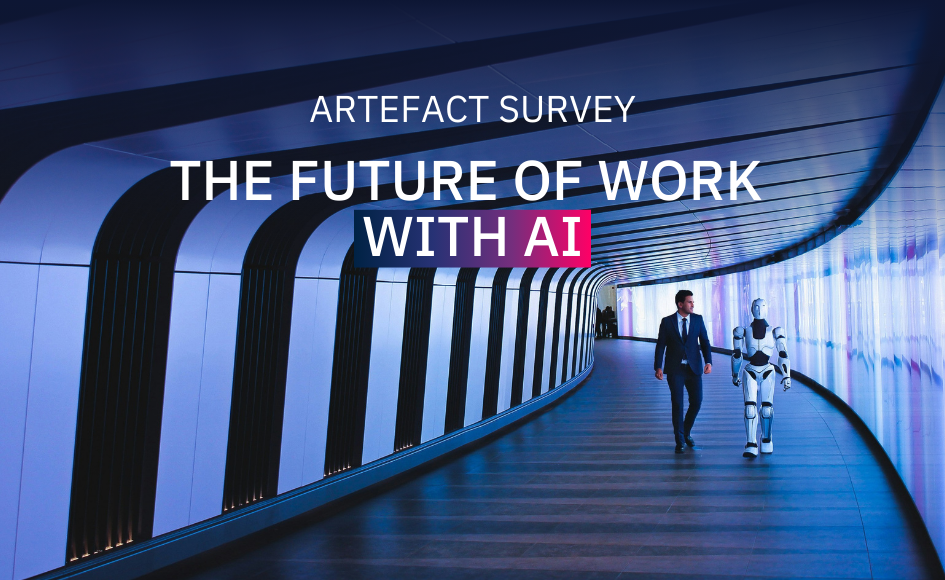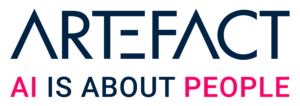Artefact, a European leader in data and AI, and Odoxa, an independent research institute, have published a pioneering study on the impact of artificial intelligence on the world of work.
This study provides an in-depth analysis of AI adoption and integration, its effects on organizational transformation, and the future of work. Conducted between October and November 2024, the quantitative survey gathered insights from a panel of over 2,000 participants. Complementing this statistical approach, around thirty interviews were conducted with key figures in digital transformation, including CEOs, COOs, and transformation leaders.
The Expert’s insight by Florence Bénézit, Expert Partner, Artefact
Collaborating with AI at Work: placing humans at the core of success
Our study highlights the already profound and growing impact of AI on organizations and professions. Far from being just a technological gadget, AI is transforming the way we work and interact daily. We have explored the paradox between the rapid adoption of generative AI in the workplace (30% of employees report that their company uses AI, and 92% of them express satisfaction) and the apparent absence of productivity gains at the enterprise level.
Traditional AI has proven that its value extends far beyond the automation of repetitive tasks. It has optimized processes with unprecedented precision, performed tasks beyond human capability at such scale and accuracy, and generated tangible productivity gains that drive growth. Among employees in departments that have adopted AI, 27% report a significant evolution in their responsibilities, and 60% observe a transformation in processes (simplification or automation). Traditional AI has also created more jobs than it has eliminated, particularly through the emergence of new technical and digital roles and by centralizing process experts around AI supervision. 25% of employees state that AI has led to the creation of new positions (vs. 20% who report job losses). The automation of simple tasks now enables employees to focus on higher-value activities such as customer service and the management of more complex or strategic topics.
With the rise of generative AI, a new dynamic is emerging. It promises to combine individual productivity gains with increased innovation. It democratizes access to powerful tools, allowing anyone to prototype applications, accelerate R&D, and generate content in unprecedented ways. This widespread adoption is transforming individual work through intelligent assistants that facilitate quality work and improve employees’ perception of their tasks. AI users save up to 57 minutes per day on average, and 83% find their work easier and more enjoyable.
However, the benefits remain limited, and companies struggle to observe overall productivity gains. To convert these individual improvements into collective productivity, companies will need to deeply rethink their processes, and employees must learn to collaborate with AI in their new tasks. AI will also play a key role in this transition by broadening access to knowledge—69% of users feel they have better access to information. However, the true revolution lies in the emergence of AI agents. These agents possess advanced cognitive capabilities: autonomous reasoning, independent information gathering to enhance decision-making, and the ability to execute complex tasks. AI agents will not only drastically improve the performance of AI assistants and therefore individual productivity, but they will also automate tasks, freeing employees from repetitive work, which will instead shift toward supervising these agents.
These autonomous systems will revolutionize operational processes, which will need to be entirely redesigned, particularly in marketing, sales, and administrative operations. For example, in the banking sector, credit processing could become nearly instantaneous, requiring only human validation for high-risk cases. This example illustrates the third key advantage of AI agents: beyond productivity and work-life quality, they will enhance service quality by significantly reducing delays and errors. However, trust in AI agents by employees remains a critical success factor.
This trust is not acquired merely through better technologies but through a gradual process in which employees experiment with AI, allowing agents to take on more responsibilities and autonomy as they prove their reliability. Teams will need support from their companies throughout this journey, especially to evolve processes, establish human supervision, and ensure robust control mechanisms.
This is a major transformation with far-reaching consequences—the World Economic Forum anticipates a 22% annual increase in AI-related jobs and up to a 110% increase for data-related professions.
To seize these opportunities and benefit from AI, companies must:
- Train their teams: 51% of current users report needing additional skills to master AI tools.
- Create a framework of trust by co-developing the future of work and establishing ethical mechanisms to ensure AI’s acceptability.
- Rethink their processes, combining the potential of AI agents with human expertise.
- Build a robust AI infrastructure that enables agents to access reliable knowledge and take action effectively.
Companies that can invest in AI and integrate these innovations while leveraging their human expertise will position themselves as leaders in their respective industries. AI is not just a tool for productivity and performance; it is also a catalyst for organizational and human transformation.

 BLOG
BLOG




